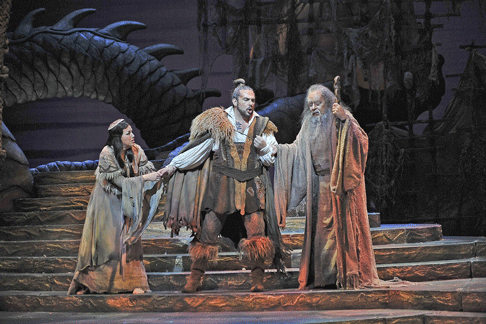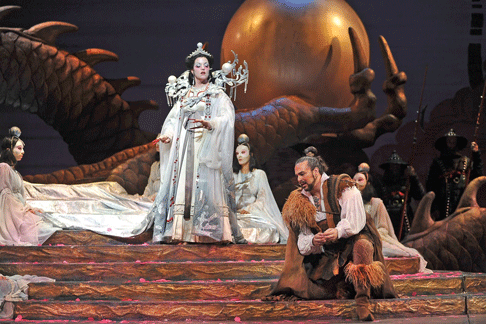07 Feb 2011
Turandot, Florida Grand Opera
In 2010, Florida Grand Opera held a gala to honor Robert Heuer on his 25th anniversary as general director.

In 2010, Florida Grand Opera held a gala to honor Robert Heuer on his 25th anniversary as general director.
On hand to join in the festivities was the great American baritone Sherrill Milnes who named Florida Grand Opera among the nation’s top regional companies. Compliment or challenge? The ultimate challenge for FGO in this, its 70th season may be to maximize efficiency without sacrificing quality. Dusting off thirty-year-old Turandot sets for the season opener (seen November 13th) speaks to the former and maintains a streak begun in 2009 of presenting productions designed and created for FGO.
Two features were immediately identifiable on curtain: a stage-covering set, the aft section of which molds the Forbidden City into a dragon, and the plush atmosphere that are quintessential Bliss Hebert (Staging) and Allen Charles Klein (Sets, costumes and lighting). A flash point in this scene is a sharpening wheel setting off sparks as the many executioners run swords across it. Act Three brings a particularly dark and dank garden, as Calaf and townspeople contemplate a sleepless night. Fine points in the work of Klein and Michelle Diamantides (Wigs and Makeup) include Ping, Pang and Pong wearing Kabuki face paint, and a wide palette of costume variations (Sumo gear on executioners, Samurai outfits on soldiers, and Sages of caricatured pre-frontal cortexes).
Familiarity was also supplied by the musical direction of Ramon Tebar, wielding baton here again, having led FGO’s Lucia last season. Tebar seems to prefer slow, deliberate beats that were quite successful in this Turandot, if taxing on some singers. The orchestra met crucial moments head on, playing chords strongly — with powerful horns and hammered, note-perfect percussions; the Riddle Scene simmered in mystery. Less successful was the over-bright harp playing following Turandot’s lines and a general slackening of musical structure in Act Two.
Lise Lindstrom is in exclusive company: singers that can easily clear the steep crests of Turandot. Her voice is penetrating and interesting, warming to the ears as the night progressed. Lindstrom excelled in Alfano’s passages, possibliy presaging a move into Wagner. In currying the Emperor’s sympathy and hinting at curiosity over Liu’s devotion, Lindstrom delved into La Principessa’s internal struggles. Where Lindstrom’s voice is pointed in focus, Frank Porretta’s is spread, making for shaky balancing with the orchestra. Still, Porretta’s Calaf stayed the course with well-taken but inconsistent legato and game attempts at varying expressiveness.
 Frank Porretta as Calaf, Elizabeth Caballero as Liu and Kevin Langan as Timur
Frank Porretta as Calaf, Elizabeth Caballero as Liu and Kevin Langan as Timur
Elizabeth Caballero’s vocal glamour is well-known to audiences here and on that reputation she did not renege as Liu. Refined musical accents abounded — pianissimo in the correct places and generous outpourings of sound from notes in the meat of her voice. Kevin Langan’s Timur - fragile, sincere and strong of heart - was perhaps the most complete characterization of the evening. Robert Dundas is a youthful voiced Emperor of noble spirit. All supporting parts came off aptly, with a vote of vocal promise for the second handmaiden Emilia Acon, a distinctly rich sound. Hebert’s blocking and Rosa Mercedes’ fine and uniform choreography cushion production elements that verge on excessive. In Puccini’s final work, impact rests greatly on the chorus and FGO’s group is polished and disciplined under the direction of John Keene; Timothy A. Sharp drew a solid performance from Miami Children’s Chorus.
Robert Carreras
 Lise Lindstrom as Turandot and Frank Porretta as Calaf
Lise Lindstrom as Turandot and Frank Porretta as Calaf